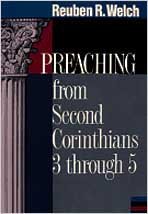WHDL - 00006500
 Visit the home page
Visit the home page
About Site Language
WHDL is viewable in multiple languages. Use the pull-down menu to select a language to view the site.
I changed my language, but I’m still seeing resources in the other languages?
If a resource or text has not been translated into your selected language, it will appear in the initially added language. We are always looking for help translating these resources. If you can help, contact us!
WHDL - 00006500


click to copy
Welch, R (n.d.). Preaching from Second Corinthians 3 Through 5 . Beacon Hill Press
Welch, ReubenPreaching from Second Corinthians 3 Through 5 . Beacon Hill Press, n.d.
Welch, ReubenPreaching from Second Corinthians 3 Through 5 . Beacon Hill Press, n.d.
Welch, ReubenPreaching from Second Corinthians 3 Through 5 . Beacon Hill Press, n.d.
This noted biblical expositor works through a very challenging portion of scripture dealing with the glory of the new covenant, treasures in jars of clay, our heavenly dwelling, the ministry of reconciliation. Excellent model for sermon development at its best.
From the introduction:
More of the real, human Paul is revealed in 2 Corinthians than in any of his other Epistles. We see a man obsessed with a divine call, struggling to defend both the integrity of the gospel and the validity of his apostleship as he deals with a proud, gifted, and fractious church. The letter reflects his pain and his hurt; it also reflects his courage and his hope. Most of all, we see a loving pastor determined not to let his congregation go. Whatever the struggle, whatever the pain, he will remain committed to them, seeking to bring them to full loyalty to Christ. We see in this letter the way the gospel is brought to bear upon the real problems of a real church. Its meaning is not presented in an orderly or formal way, as in Romans, for instance, but through Paul's confessions, defenses, and exhortations as he deals with leaders opposed to him and a congregation unsure of him. This is both an advantage and a disadvantage to us who preach from 2 Corinthians. The disadvantage is that the connections between Paul's relationship with the church and what he says to it are so intimate and complicated that we can't separate the two. We can spend too much time talking about Paul's involvement with the Corinthian church and not enough time hearing and declaring God's word to our church through his words to them. The advantage is that the Corinthian situation is as relevant as tomorrow. Paul's relations with the church and the problems he had with it sound like a pastor's report at district assembly. We can't preach from this book without preaching directly to the real needs of both ourselves and our people. And in our preaching we will discover the 7 judging, redeeming, and reconciling power of the gospel still at work in the human, fragmented Church, which is His Body. Our study will consist of four parts. In the first we will discuss methodology, dealing with some ways to begin the study of 2 Corinthians 3-5. Next, we will work our way exegetically and expositionally through the passage to better understand what Paul meant by the words he used. In the third part we will suggest and illustrate some ways the texts can be used in preaching. Finally, we will seek to discover contemporary preaching values by examining the great themes and the significant questions that underlie Paul's defense of his ministry and his gospel.
2019
2017
2016
2004
2018
1920
1952
2019
2018
2020